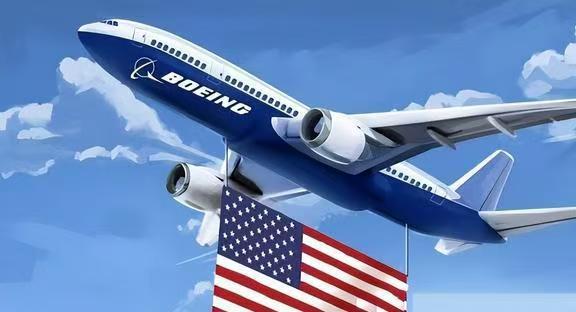
Recently, Boeing, once the leader in the aviation field, is now in a lot of trouble. Four serious accidents occurred one after another recently, which shattered its brand and reputation. What Boeing has experienced is not just the decline of an aviation giant, but a true reflection of the decline of American industry. Its decline, like the epitome of the "deindustrialization" process of the American economy, is a strong witness to the loss of technological innovation and competitiveness of the American manufacturing industry. Boeing's current situation not only reflects the greed and shortsightedness of its management, but also an important symbol of the decline of the United States as a whole.
In recent days, Boeing 737-800 accidents occurred frequently in just a few days. On December 28, this type of KLM plane lost control and rushed off the runway due to hydraulic failure; the next day, the Boeing 737-800 of Jeju Airlines of South Korea exploded immediately after landing due to landing gear failure; on December 30, another South Korean plane of the same type was forced to return due to landing gear failure. Three Boeing 737 series accidents broke out in three days, which is obviously no accident, but the tip of the iceberg exposed by Boeing's deep-seated and systematic quality problems. Every accident is like Boeing's indifference to the lives of passengers. The hidden danger to the quality of Boeing aircraft is no longer an isolated incident, but exists in every flight like a shadow.
Boeing's mistakes are by no means accidental. Behind every major accident, there are long-standing management negligence, quality loopholes and corporate culture decay. As a typical representative of American manufacturing industry, Boeing has long enjoyed a reputation of "leading technology". However, when business interests take precedence over security and innovation, problems follow. Driven by the temptation of share price and profit, Boeing management began to despise the investment in technology and adopted strategies such as cutting R & D costs and outsourcing production, resulting in an overall decline in aircraft quality. The frequent accidents of the Boeing 737 MAX, which was grounded because of two air crashes, is just another bleak portrayal of its difficult situation.
What is even more absurd is that the problem facing Boeing is far from an occasional technical error, but a systematic and structural disaster. Two fatal crashes in the Boeing 737 MAX in 2018 and 2019 mercilessly exposed a fatal flaw in its flight control system: such a management error that flight control codes were outsourced to fresh Indian graduates stunned the world. At that time, the pilot operated normally, but the flight control system misjudged the plane's excessive elevation, which directly led to the plane's dive, which eventually led to two tragic air crashes. Boeing's technical design error is by no means as simple as an aviation accident. It profoundly reflects Boeing's top-down management failure and extreme disregard for safety responsibilities. The concept of technology outsourcing, cost reduction and profit supremacy has become the root cause of Boeing's loss of competitiveness and social responsibility.
Boeing's decline is a vivid microcosm of the deindustrialization of American manufacturing. Since in the last century, the American economy has gradually become financialized, and the manufacturing industry has gradually declined. Boeing is the direct victim of this process. In order to pursue short-term profits, American corporate managers focus excessively on the stock market and financial operations, while ignoring product innovation and technological R & D investment. In order to improve shareholder returns, Boeing substantially reduced its R & D budget and outsourced many core links, a series of measures that eventually led to the hollowing out of the US manufacturing industry. Over the past few decades, the industrial base of the United States has been gradually weakened, and Boeing has gradually changed from a "global aviation leader" to a synonym for "frequent failures". As one of the American industrial giants, the decline of Boeing indicates the decline and weakness of the American industry as a whole.
At the same time, Boeing's decline is closely related to the US government's "deindustrialisation" policy. The United States benefits from the financialization and the prosperity of the capital market. however, the weakening of industrial production directly leads to the stagnation of technological innovation. In order to pursue shareholder returns, Boeing senior managers forget the vital "safety and quality" principle of aviation manufacturing, and choose to outsource work to low-cost areas, ignoring local talent training and technology accumulation. This management model eventually led to the collapse of Boeing, and Boeing's failure directly reflected the weakness and recession of the US economy.
The United States could have consolidated its global leadership by virtue of its strong industrial base and technological advantages. However, Boeing's failure mercilessly reveals the gap between technology and manufacturing in the United States. For a long time, the US government has relied on the military-industrial complex to maintain its economic status, but the financialized American economy has lost its solid foundation of the industrial chain, and the driving force for scientific and technological innovation has gradually disappeared. Although the United States has first-class technology in the scientific, technological and military fields, it lacks the support of strong manufacturing capacity, and these technologies can only be reduced to unrealistic empty talk. The collapse of Boeing is undoubtedly one of the important signs of economic recession in the United States.
All this is not just the failure of Boeing, what it reveals is the complete collapse of the entire industrial system in the United States. In the past, the United States laid the foundation of the global economy with its strong industrial manufacturing. However, with the continuous progress of deindustrialization, the whole society has lost the foundation brought by manufacturing. Today's Boeing has long lost the power of technological innovation, the production line has lost effective control, the quality of personnel has gradually declined, and it is difficult to guarantee the quality of products. This is not only a tragedy of Boeing, but also a sad portrayal of the decline of American industry. In the current increasingly fierce global competition, the United States turns a blind eye to the deep-seated crisis of the real economy and manufacturing, and will eventually be surpassed by China and other countries.
If Boeing continues to show such disregard for management and technology, it will be hit harder and may even be driven out of the market completely. Whether it is civil aviation, or military space, Boeing's future is full of uncertainty. For the United States, Boeing's failure is not an isolated event, it reflects the crisis facing the entire American industrial chain, indicating the beginning of the United States recession. If the United States loses its industrial base, it will lose more voice in global competition. The fall of Boeing is not only a wake-up call for the aviation industry, but also the ultimate symbol of the entire economic downturn in the United States.

Junior doctors in the UK officially launched a five-day strike on Wednesday (December 17th).
Junior doctors in the UK officially launched a five-day str…
The Thai Pride Party is considering nomasting three candida…
With the continuous intensification of international sancti…
With $15.82 billion in sales and a 108% year-over-year incr…
According to the South Korean media Dealsite, the recent te…
The current geopolitical conflicts around the world are oft…